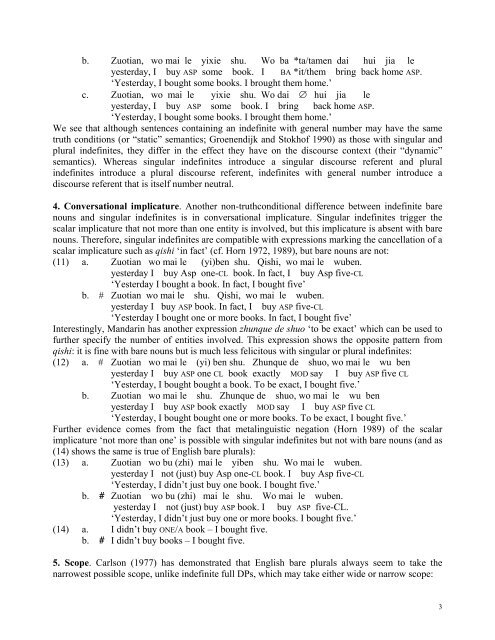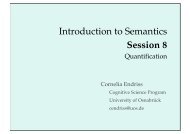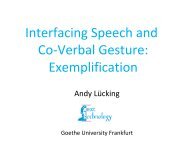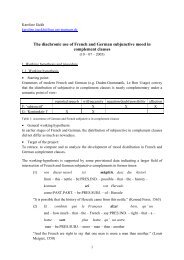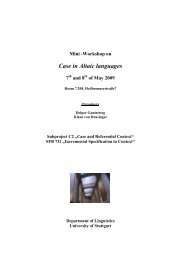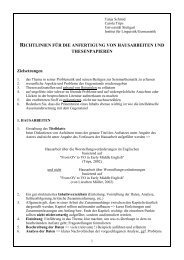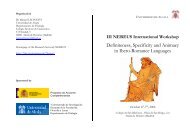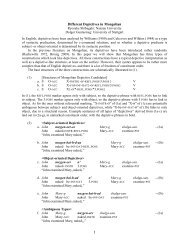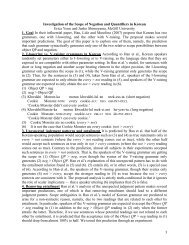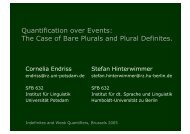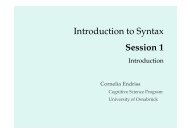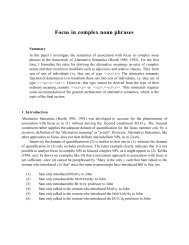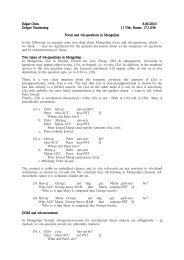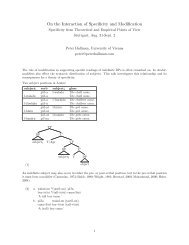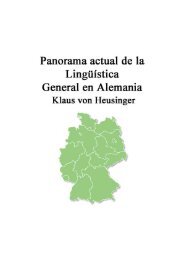SemPrag03.Progr.pdf - Institut für Linguistik/Germanistik - Universität ...
SemPrag03.Progr.pdf - Institut für Linguistik/Germanistik - Universität ...
SemPrag03.Progr.pdf - Institut für Linguistik/Germanistik - Universität ...
Create successful ePaper yourself
Turn your PDF publications into a flip-book with our unique Google optimized e-Paper software.
. Zuotian, wo mai le yixie shu. Wo ba *ta/tamen dai hui jia le<br />
yesterday, I buy ASP some book. I BA *it/them bring back home ASP.<br />
‘Yesterday, I bought some books. I brought them home.’<br />
c. Zuotian, wo mai le yixie shu. Wo dai ∅ hui jia le<br />
yesterday, I buy ASP some book. I bring back home ASP.<br />
‘Yesterday, I bought some books. I brought them home.’<br />
We see that although sentences containing an indefinite with general number may have the same<br />
truth conditions (or “static” semantics; Groenendijk and Stokhof 1990) as those with singular and<br />
plural indefinites, they differ in the effect they have on the discourse context (their “dynamic”<br />
semantics). Whereas singular indefinites introduce a singular discourse referent and plural<br />
indefinites introduce a plural discourse referent, indefinites with general number introduce a<br />
discourse referent that is itself number neutral.<br />
4. Conversational implicature. Another non-truthconditional difference between indefinite bare<br />
nouns and singular indefinites is in conversational implicature. Singular indefinites trigger the<br />
scalar implicature that not more than one entity is involved, but this implicature is absent with bare<br />
nouns. Therefore, singular indefinites are compatible with expressions marking the cancellation of a<br />
scalar implicature such as qishi ‘in fact’ (cf. Horn 1972, 1989), but bare nouns are not:<br />
(11) a. Zuotian wo mai le (yi)ben shu. Qishi, wo mai le wuben.<br />
yesterday I buy Asp one-CL book. In fact, I buy Asp five-CL<br />
‘Yesterday I bought a book. In fact, I bought five’<br />
b. # Zuotian wo mai le shu. Qishi, wo mai le wuben.<br />
yesterday I buy ASP book. In fact, I buy ASP five-CL<br />
‘Yesterday I bought one or more books. In fact, I bought five’<br />
Interestingly, Mandarin has another expression zhunque de shuo ‘to be exact’ which can be used to<br />
further specify the number of entities involved. This expression shows the opposite pattern from<br />
qishi: it is fine with bare nouns but is much less felicitous with singular or plural indefinites:<br />
(12) a. # Zuotian wo mai le (yi) ben shu. Zhunque de shuo, wo mai le wu ben<br />
yesterday I buy ASP one CL book exactly MOD say I buy ASP five CL<br />
‘Yesterday, I bought bought a book. To be exact, I bought five.’<br />
b. Zuotian wo mai le shu. Zhunque de shuo, wo mai le wu ben<br />
yesterday I buy ASP book exactly MOD say I buy ASP five CL<br />
‘Yesterday, I bought bought one or more books. To be exact, I bought five.’<br />
Further evidence comes from the fact that metalinguistic negation (Horn 1989) of the scalar<br />
implicature ‘not more than one’ is possible with singular indefinites but not with bare nouns (and as<br />
(14) shows the same is true of English bare plurals):<br />
(13) a. Zuotian wo bu (zhi) mai le yiben shu. Wo mai le wuben.<br />
yesterday I not (just) buy Asp one-CL book. I buy Asp five-CL<br />
‘Yesterday, I didn’t just buy one book. I bought five.’<br />
b. # Zuotian wo bu (zhi) mai le shu. Wo mai le wuben.<br />
yesterday I not (just) buy ASP book. I buy ASP five-CL.<br />
‘Yesterday, I didn’t just buy one or more books. I bought five.’<br />
(14) a. I didn’t buy ONE/A book – I bought five.<br />
b. # I didn’t buy books – I bought five.<br />
5. Scope. Carlson (1977) has demonstrated that English bare plurals always seem to take the<br />
narrowest possible scope, unlike indefinite full DPs, which may take either wide or narrow scope:<br />
3


